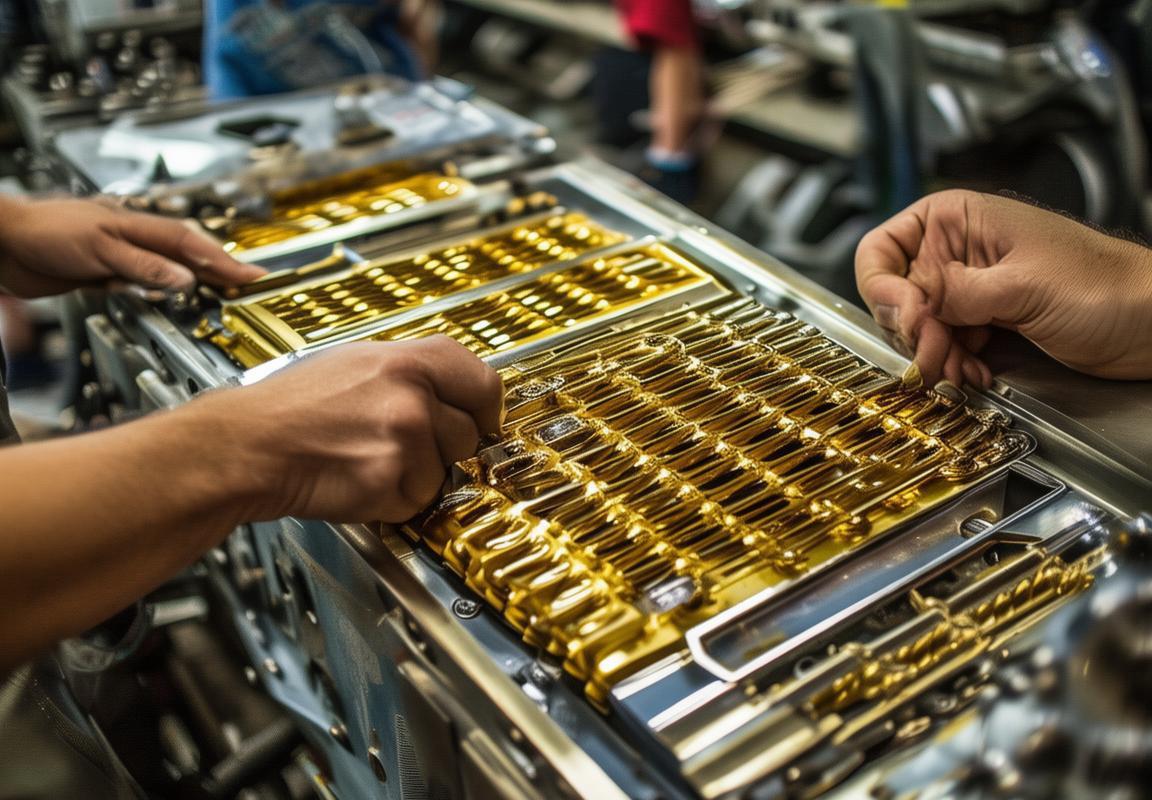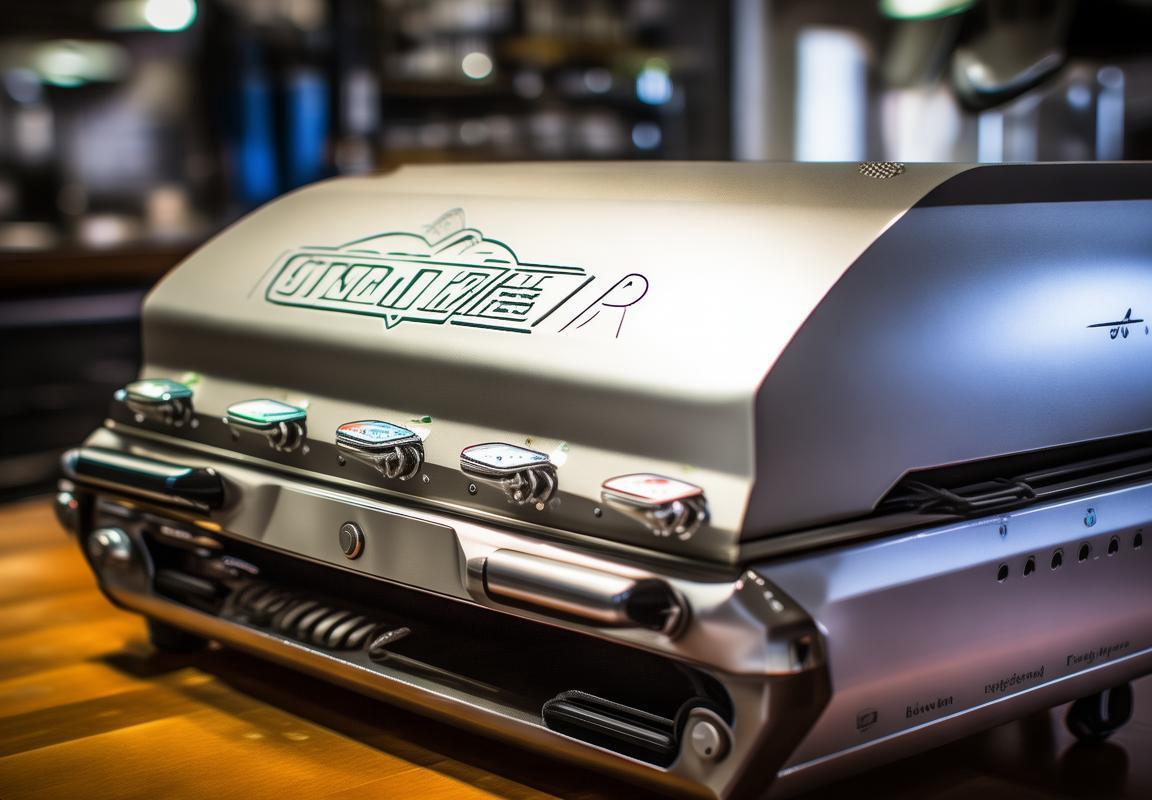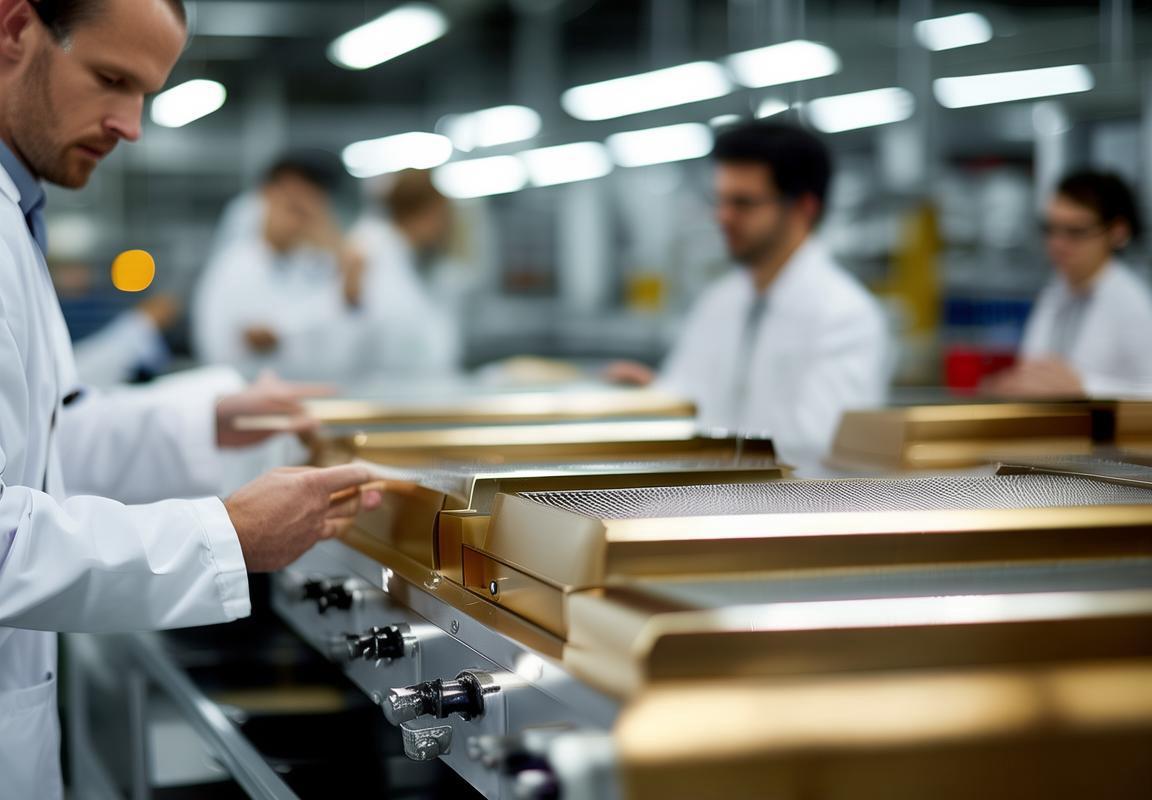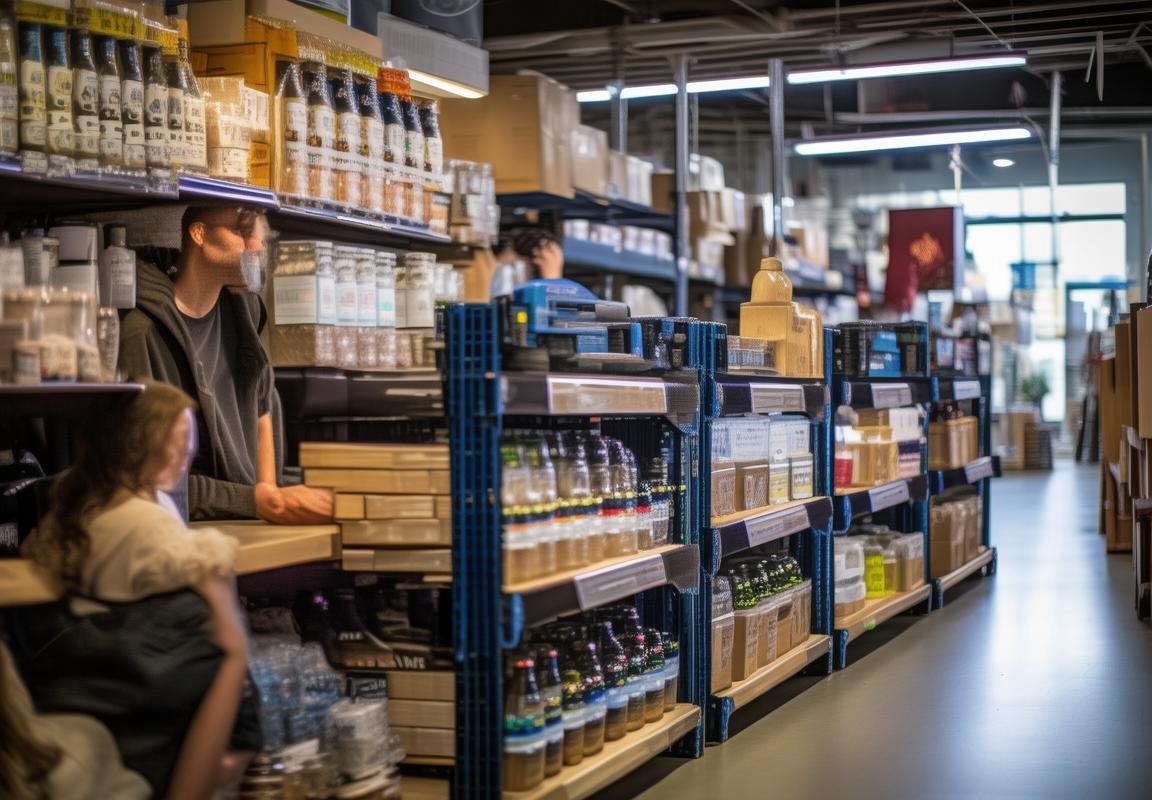Navigating the world of private label suppliers can be a game-changer for businesses looking to offer unique products with their own branding. In this ever-evolving market, understanding the nuances of working with a contact grill private label supplier is crucial. From customizing your product to ensuring quality and cost-effectiveness, the journey is filled with opportunities to stand out in the competitive landscape. Let’s delve into the key aspects of this partnership and how it can propel your business forward.
Discover the Benefits of Contact Grill Private Label Suppliers
Contact Grill Private Label Suppliers offer a plethora of benefits for businesses looking to enter the market or expand their product line. By opting for a private label supplier, you gain access to a world of advantages that can significantly enhance your brand’s presence and profitability. Let’s delve into some of the key benefits that come with choosing a contact grill private label supplier.
Firstly, customization is a cornerstone of private label suppliers. You have the power to create a product that truly reflects your brand’s identity. From the design of the grill to the packaging, every detail can be tailored to resonate with your target audience. This level of personalization not only sets your product apart from competitors but also fosters a stronger connection with your customers.
Secondly, cost-effectiveness is a major draw for many businesses. Private label suppliers often offer bulk purchasing discounts, allowing you to invest in larger quantities and reduce your per-unit cost. This can be particularly beneficial if you’re looking to launch a new product or increase your inventory levels. Additionally, the supplier handles the production process, saving you time and resources that would otherwise be spent on manufacturing.
Quality control is another critical advantage. When you work with a reputable private label supplier, you can rest assured that the products you’re selling meet high standards. These suppliers have established processes to ensure that each contact grill is not only functional but also durable and safe for consumers. This gives you peace of mind and builds trust with your customers.
Thirdly, private label suppliers can help you enter new markets with ease. They have the knowledge and experience to understand the local regulations, preferences, and distribution channels. This can be a significant advantage if you’re looking to expand your business geographically or cater to a niche market.
Innovation is often at the forefront of private label suppliers’ offerings. They stay abreast of the latest trends and technologies in the grill industry, allowing you to bring cutting-edge products to market. This can give your brand a competitive edge and keep you ahead of the curve.
Furthermore, private label suppliers can offer a range of packaging solutions that not only protect your product but also enhance its appeal on the shelf. From eco-friendly options to eye-catching designs, packaging can be a key differentiator. A supplier that offers creative packaging solutions can help your product stand out and attract more customers.
Marketing support is also a valuable aspect of working with a private label supplier. Many suppliers provide assistance with marketing materials, promotional strategies, and even co-branding opportunities. This can help you launch your product with a strong marketing push, increasing your chances of success.
Another benefit is the flexibility that private label suppliers offer. Whether you need a small batch for testing or a large production run for a big sale, suppliers can accommodate your varying needs. This adaptability ensures that you can respond quickly to market demands and capitalize on opportunities as they arise.
Lastly, private label suppliers can help you streamline your supply chain. By handling the manufacturing, quality control, and distribution, they eliminate the complexities and risks associated with these processes. This allows you to focus on other aspects of your business, such as sales and customer service.
In summary, the benefits of working with a contact grill private label supplier are numerous. From customization and cost savings to quality control and market entry, these suppliers offer a comprehensive solution for businesses looking to enhance their product offerings. By leveraging these advantages, you can build a stronger brand, increase your market share, and ultimately, achieve greater success in the competitive grill industry.

Why Choose a Private Label Supplier for Your Grill Needs?
Partnering with a private label supplier for your grill needs can offer a multitude of advantages that can significantly boost your business. Here’s a closer look at why this approach is often the preferred choice for entrepreneurs and businesses in the grilling industry:
-
Brand Building: When you choose a private label supplier, you’re essentially starting with a clean slate. You can create a brand identity from the ground up, ensuring that every aspect of your product—from design to packaging—reflects your brand values and vision. This level of customization is hard to achieve with mass-produced items.
-
Competitive Edge: In a crowded market, differentiating your product can be a game-changer. Private label suppliers allow you to offer unique features or designs that set your grill apart from competitors. This differentiation can help you attract new customers and retain loyal ones.
-
Cost-Effective: Private label suppliers often have streamlined operations and bulk purchasing power, which can lead to significant cost savings. By avoiding the high costs associated with manufacturing and marketing a completely new product, you can allocate your budget more strategically to other areas of your business.
-
Quality Control: When you work with a private label supplier, you can establish strict quality control measures. This means that you can be confident in the durability and performance of your grills, which is crucial for building trust with your customers.
-
Quick to Market: If you’re looking to launch a new grill product quickly, private label suppliers can be a lifesaver. They typically have a faster production time compared to creating a new product from scratch. This agility can be crucial for capitalizing on market trends or seasonal opportunities.
-
Customization Flexibility: Whether you want to modify the size, color, or even the features of your grill, private label suppliers can accommodate these requests. This flexibility allows you to cater to specific market segments or customer preferences.
-
Marketing Support: Many private label suppliers offer marketing support, which can be invaluable for new businesses. This might include branding guidelines, co-branded marketing materials, or even assistance with advertising campaigns.
-
Ongoing Innovation: A private label supplier can act as a partner in innovation. They can provide insights into the latest grilling technologies and trends, helping you stay ahead of the curve and offering your customers the latest in grilling solutions.
-
Scalability: As your business grows, a private label supplier can scale with you. Whether you need to increase production or expand into new markets, they can adjust their operations to meet your evolving needs.
-
Focus on Your Core Business: By outsourcing the manufacturing and supply chain to a private label supplier, you can focus on what you do best—running your business. This can lead to increased efficiency and productivity.
-
Customer Loyalty: When customers see that you are committed to providing them with high-quality, uniquely branded products, they are more likely to develop loyalty towards your brand. This loyalty can translate into repeat business and positive word-of-mouth referrals.
-
Adaptability to Market Changes: The market is always evolving, and being able to adapt quickly is key. A private label supplier can help you pivot your product line to respond to changes in consumer preferences, regulatory requirements, or supply chain disruptions.
-
Global Reach: If you aspire to sell your grills internationally, a private label supplier can assist in navigating the complexities of global trade, including regulations, shipping, and cultural considerations.
-
Long-Term Partnerships: Many private label suppliers are interested in building long-term relationships with their clients. This can lead to ongoing support, special deals, and a sense of partnership that can benefit your business over time.
-
Ethical and Sustainable Practices: Some private label suppliers prioritize ethical and sustainable manufacturing practices. By choosing such a supplier, you can align your brand with these values, which can be a significant draw for consumers who are increasingly concerned about where and how products are made.
In summary, choosing a private label supplier for your grill needs can offer a wide range of benefits that support your brand’s growth, enhance your market position, and streamline your operations. From customization and cost savings to quality assurance and market agility, the advantages are clear, making private labeling a compelling option for businesses looking to excel in the grilling industry.

How to Find a Reliable Contact Grill Private Label Supplier
Navigating the market for a reliable contact grill private label supplier can seem daunting, but with the right approach, you can find a partner that aligns with your brand’s vision and product quality expectations. Here are some key steps to help you in your search:
-
Define Your Requirements: Before you start looking for a supplier, have a clear understanding of what you need. Consider the size and capacity of the grills, the materials used, the design specifications, and any additional features you want to include. This will help you communicate effectively with potential suppliers.
-
Research Online: Use the internet to your advantage. Search for private label suppliers of contact grills, and don’t forget to explore industry-specific directories and forums. Look for suppliers with a strong online presence, as this can indicate a level of professionalism and customer service.
-
Check Reviews and Testimonials: Once you have a list of potential suppliers, look for reviews and testimonials from other customers. This can provide valuable insights into the supplier’s reliability, product quality, and customer satisfaction. Pay attention to both positive and negative feedback to get a balanced view.
-
Attend Trade Shows and Expos: Trade shows are a great way to meet suppliers face-to-face. You can see their products up close, discuss your requirements, and get a feel for their business practices. Networking with suppliers at these events can also lead to long-term relationships.
-
Request Samples: Don’t hesitate to ask for samples of the contact grills. This allows you to evaluate the quality, functionality, and design of the products. Pay attention to the craftsmanship, materials, and the overall build quality. Samples are a crucial step in ensuring that the supplier can meet your standards.
-
Verify Certifications and Compliance: Ensure that the supplier complies with all relevant safety and quality standards. Look for certifications such as ISO, CE, or FDA approval, which indicate that the products meet stringent industry requirements. This is particularly important if you plan to sell your grills in different markets.
-
Evaluate Production Capabilities: A reliable supplier should be able to provide detailed information about their production capabilities. This includes their manufacturing processes, quality control measures, and lead times. It’s important to find a supplier who can handle your order size and deliver on time.
-
Consider the Supplier’s Location: The geographic location of your supplier can impact your costs and lead times. Suppliers in countries with lower labor costs may offer competitive pricing, but they might also have longer shipping times. Evaluate the trade-offs and choose a location that aligns with your business goals.
-
Discuss Pricing and Payment Terms: Transparent communication about pricing and payment terms is crucial. Ensure that you understand all costs associated with the product, including manufacturing, shipping, and any additional fees. Negotiate payment terms that are favorable to your business and secure your investment.
-
Establish a Relationship: Building a strong relationship with your supplier is key to a successful partnership. Regular communication, clear expectations, and a willingness to collaborate can lead to a more streamlined process and better outcomes. Don’t hesitate to ask for support or assistance as needed.
-
Visit the Factory: If possible, arrange a visit to the supplier’s factory. This can give you a firsthand look at their operations, from raw material handling to the final product. It’s an opportunity to see the quality control in action and to understand the supplier’s commitment to excellence.
-
Be Mindful of Minimum Order Quantities: Private label suppliers often have minimum order quantities (MOQs) to ensure economies of scale. Be prepared to meet these requirements, as they are in place to cover the supplier’s production costs. However, some suppliers may be flexible or offer options to lower the MOQ.
-
Seek References: Don’t be afraid to ask for references from the supplier. Contact these references to learn about their experience working with the supplier and the quality of the products they received. This can provide you with real-world feedback on the supplier’s performance.
-
Stay Informed About Trends: Keep up with industry trends and innovations. A reliable supplier should be aware of these trends and be able to offer you the latest in contact grill technology. This ensures that your product remains competitive in the market.
-
Plan for Future Collaboration: Think about the potential for future collaboration. A reliable supplier can be a long-term partner, providing you with consistent product quality and support. Consider how the supplier’s products can evolve with your brand and market demands.
By carefully considering these steps, you can find a reliable contact grill private label supplier that will help you bring your product to market successfully. Remember, the right supplier can make all the difference in the quality and success of your brand.

The Process of Working with a Contact Grill Private Label Supplier
Navigating the world of contact grill private label suppliers can be a complex journey, but understanding the process can make it smoother. Here’s a detailed look at what you can expect when working with such a supplier:
Understanding Your Product RequirementsBefore you dive into the supplier search, it’s crucial to have a clear understanding of your product requirements. This includes the size, design, features, and materials you want for your contact grill. Having a detailed specification sheet or prototype can greatly aid in communication and ensure that the supplier understands your vision.
Researching Potential SuppliersStart by conducting thorough research to identify potential private label suppliers. Look for companies with a strong online presence, positive customer reviews, and a history of working with businesses similar to yours. Consider factors like their product range, production capacity, and whether they offer customization services.
Contacting SuppliersOnce you have a list of potential suppliers, reach out to them. Introduce your brand and clearly outline your requirements. Be prepared to provide any necessary documentation, such as certifications or technical specifications. This initial contact sets the tone for the rest of the relationship, so it’s important to be professional and clear.
Evaluating Supplier CapabilitiesDuring your initial conversations, assess the supplier’s capabilities. Ask about their production process, quality control measures, lead times, and minimum order quantities. It’s also beneficial to inquire about their ability to handle any potential customizations or modifications you may require.
Requesting SamplesRequesting samples is a critical step in the process. This allows you to evaluate the quality and functionality of the contact grill firsthand. Pay attention to the build quality, materials used, and how the grill performs. Don’t hesitate to ask for additional samples if the first batch doesn’t meet your expectations.
Negotiating TermsOnce you’ve selected a supplier, it’s time to negotiate the terms of the agreement. This includes discussing pricing, payment schedules, delivery timelines, and any legal considerations. Be sure to clarify who is responsible for shipping costs and any potential customs duties or taxes.
Creating a Production ScheduleWork with your supplier to create a production schedule that aligns with your business needs. This should include a timeline for when you expect to receive samples, when the order will be placed, and when the final products will be delivered. Having a clear schedule helps to manage expectations and ensures that both parties are on the same page.
Quality Control and InspectionsA reliable supplier will have a robust quality control process in place. Request information about their quality control measures and consider scheduling an inspection if possible. This could involve visiting the factory or hiring a third-party inspector to ensure that the final product meets your standards.
Finalizing the OrderOnce all details are agreed upon and the quality control process is in place, it’s time to finalize the order. This involves confirming the final design, quantity, and specifications. Ensure that any special instructions or branding elements are clearly communicated to avoid any misunderstandings.
Managing the Production ProcessThroughout the production process, maintain open lines of communication with your supplier. Regular updates on the status of your order can help prevent any unexpected delays. Be prepared to address any issues that may arise promptly to keep the process moving forward.
Receiving and Inspecting the Final ProductUpon receiving the final product, conduct a thorough inspection. Check for any defects, ensure that the product matches the specifications, and verify that all branding is correct. If there are any issues, address them immediately with your supplier to resolve them before they impact your business.
Order Fulfillment and DistributionOnce the contact grills pass your inspection, you can proceed with order fulfillment. This may involve packaging the products according to your branding guidelines and distributing them to your customers or retailers. Keep track of inventory and plan for future orders to maintain a steady supply of your private-label grills.
Post-Production SupportEven after the order is fulfilled, the relationship with your supplier should continue. Be open to feedback and discuss any improvements or changes that could be made for future orders. Building a strong, ongoing partnership with your private label supplier can lead to better products and services over time.

Customization Options: Tailoring Your Contact Grill to Your Brand
Understanding the importance of branding in the marketplace, working with a contact grill private label supplier offers a plethora of customization options to ensure your product resonates with your brand identity. Here’s a closer look at how you can tailor your contact grill to reflect your brand:
Your Brand’s Logo and Imagery- The first step in customization is to decide how your brand’s logo and imagery will be integrated into the design of the grill. This could be through embossing, silk-screen printing, or laser engraving, depending on the material and finish of the grill.
Color Schemes and Finishes- The color palette and finish of your contact grill can be a powerful statement of your brand. Whether you opt for a sleek, metallic finish or a more rustic, wood-grain look, the right color scheme can enhance your brand’s visual appeal and stand out on store shelves.
Custom Packaging- Packaging is often the first point of contact a consumer has with your product. A private label supplier can create custom packaging that not only protects your grill but also showcases your brand’s personality. This might include branded boxes, labels, and even custom inserts that highlight key features or recipes.
Unique Features and Specifications- Your contact grill can be tailored to include unique features that align with your brand’s values and product offerings. This could mean adding a special coating for non-stick performance, incorporating eco-friendly materials, or enhancing the grill’s functionality with innovative features like adjustable heat settings.
Branding the Controls and Handles- The controls and handles of the grill are prime locations for branding. By customizing these elements, you can ensure that every aspect of the product reinforces your brand’s image. This could involve adding your brand’s name, tagline, or a distinctive design that makes your grill easily recognizable.
Custom Recipes and Instruction Cards- To further establish your brand’s presence, consider including custom recipe cards or instruction guides with your contact grill. These can feature your brand’s logo and can be designed to complement the grill’s design, providing a cohesive brand experience from the packaging to the cooking experience.
Marketing Materials and Promotional Items- A private label supplier can also help you create additional marketing materials and promotional items that align with your brand. This might include custom coasters, oven mitts, or even a branded apron that consumers can use while grilling, extending your brand’s reach beyond the grill itself.
Quality Assurance and Brand Consistency- When customizing your contact grill, it’s crucial to maintain quality assurance standards. The materials, construction, and performance of the grill should all align with your brand’s commitment to excellence. A reliable supplier will work with you to ensure that the customization process doesn’t compromise the quality of the product.
Sustainability and Social Responsibility- For brands that prioritize sustainability and social responsibility, a private label supplier can help you incorporate these values into your product. This could involve sourcing materials from sustainable sources, using recyclable packaging, or supporting local communities through your brand’s initiatives.
Feedback and Iteration- Customization is an ongoing process. After the initial launch, gather feedback from customers and stakeholders to understand how well the grill aligns with your brand and where improvements can be made. This iterative approach allows you to continuously refine your product to better represent your brand.
By leveraging the customization options available through a private label supplier, you can create a contact grill that not only meets the functional needs of consumers but also serves as a powerful ambassador for your brand. The key is to work closely with your supplier to ensure that every detail of the grill reflects the essence of your brand and resonates with your target audience.

Quality Assurance: Ensuring Top-Notch Grill Products
Finding a reliable contact grill private label supplier can seem like a daunting task, but understanding the process can simplify things significantly. Here’s what you need to consider:
-
Define Your Requirements: Before you start looking for a supplier, it’s crucial to have a clear understanding of what you need. This includes the size, features, and specifications of the contact grill. Consider your target market, the price point, and any unique selling points you want to highlight.
-
Research Potential Suppliers: Take the time to research and identify potential suppliers. Look for companies with a strong online presence, good reviews, and a track record in the industry. Check out their websites, social media profiles, and any case studies or testimonials that can give you insight into their capabilities.
-
Evaluate Their Production Capacity: A reliable supplier should be able to meet your production needs, whether you’re looking for a small batch or large-scale manufacturing. Ask about their production capacity, lead times, and the ability to scale up if your business grows.
-
Inspect Their Facilities: If possible, visit the supplier’s facilities to get a firsthand look at their operations. Look for clean, well-organized spaces, advanced equipment, and a team that appears knowledgeable and committed to quality.
-
Discuss Pricing and Payment Terms: Transparent pricing is essential. Ensure that the supplier’s pricing aligns with your budget and that there are no hidden costs. Clarify payment terms, including upfront deposits, payment schedules, and any discounts for bulk orders.
-
Review Their Quality Control Measures: Quality assurance is paramount when dealing with private label products. Inquire about their quality control processes, including raw material inspections, during-production checks, and final product testing. A supplier should be able to provide certifications and compliance documentation if necessary.
-
Consider Their Customer Service: A reliable supplier should offer excellent customer service. This includes responsiveness to inquiries, willingness to work with you on custom requests, and a system for handling any potential issues or returns.
-
Explore Their Customization Options: While the base product may be the same, you want to ensure that the supplier can customize the grill to align with your brand. This might include adding your logo, changing colors, or modifying features.
-
Look for Sustainability Practices: Many businesses today are looking to partner with suppliers who share their values. If sustainability is important to your brand, ask about the supplier’s environmental policies, such as energy-efficient production processes and eco-friendly materials.
-
Request Sample Products: Before committing to a full order, request sample products. This allows you to assess the quality and design of the contact grill firsthand. Pay attention to the build quality, functionality, and aesthetics.
-
Check for Compliance with Industry Standards: Ensure that the supplier complies with all relevant industry standards and regulations. This includes food safety standards, electrical safety, and any other certifications that might be important for your market.
-
Build a Relationship: Establishing a strong, ongoing relationship with your supplier is key. A good supplier will be willing to provide support, offer advice, and be there for you as your business grows.
-
Negotiate Terms and Conditions: Don’t hesitate to negotiate terms and conditions. This could include volume discounts, extended payment terms, or exclusive rights to certain product lines.
-
Keep Communication Open: Once you’ve selected a supplier, maintain open lines of communication. Regular updates on production, shipping, and any potential issues will help ensure a smooth working relationship.
-
Be Prepared for Contingencies: Have a plan in place for what to do if there are any issues with the product or the supplier. This might include backup suppliers, quality assurance checks, or a contingency fund.
Remember, finding the right contact grill private label supplier is about more than just the product. It’s about building a partnership that can grow with your brand and provide you with a product that meets the highest quality standards. Take your time to thoroughly vet potential suppliers, and don’t rush into a decision. A well-chosen supplier can be the key to your brand’s success.

Cost-Effective Solutions for Your Business
Navigating the world of business can be challenging, especially when it comes to finding cost-effective solutions that don’t compromise on quality. When it comes to investing in contact grill products, there are several strategies that can help you achieve a balance between affordability and excellence. Here’s a closer look at how you can find cost-effective solutions for your business:
Understanding the MarketTo begin with, it’s crucial to understand the market for contact grills. Prices can vary widely based on brand, features, and the supplier’s reputation. By doing your research, you can identify the sweet spot where you can get the best value for your money.
Volume DiscountsOne of the most straightforward ways to reduce costs is by taking advantage of volume discounts. When you purchase in bulk, suppliers often offer lower prices per unit. This can be particularly beneficial if you plan to stock up on a significant number of contact grills for resale or rental.
NegotiationDon’t shy away from negotiating with your supplier. Whether it’s for a bulk purchase or a long-term partnership, having a strong negotiation strategy can lead to better terms. This might include discounts, extended payment plans, or even exclusive deals that can save you money in the long run.
Private LabelingPrivate labeling allows you to sell products under your brand name, which can sometimes be more cost-effective than purchasing branded items. By working with a private label supplier, you can often secure better pricing due to the economies of scale and the ability to order in larger quantities.
Supplier RelationshipsBuilding a strong relationship with your supplier can lead to cost savings. Suppliers who value your business may be more willing to offer discounts or special deals. Regular communication can also help you stay informed about new products or pricing changes that could benefit your business.
Eco-Friendly OptionsOpting for eco-friendly materials and manufacturing processes can sometimes reduce costs. Suppliers who prioritize sustainability may have lower overhead costs, which can be passed on to you. Plus, eco-friendly products can appeal to a growing market segment looking for environmentally responsible brands.
Supply Chain OptimizationStreamlining your supply chain can lead to significant cost savings. This might involve finding suppliers closer to your business to reduce shipping costs or consolidating orders to minimize handling and transportation expenses.
Product SourcingDon’t limit your search to just one supplier. By sourcing from multiple suppliers, you can compare prices and products, ensuring you’re getting the best deals. This competitive bidding process can also encourage suppliers to offer their best terms to secure your business.
Seasonal PurchasesTiming your purchases can be a smart way to save money. Suppliers often have sales or offer discounts during slower periods or to clear out excess inventory. By planning ahead, you can take advantage of these opportunities without rushing into a purchase.
Financial LeverageConsider using financial leverage to your advantage. This could mean using purchase orders as a form of credit, allowing you to pay for your products over time rather than all at once. This can help manage your cash flow and potentially secure better terms with your supplier.
Innovation and EfficiencyInvesting in innovative and efficient products can lead to long-term cost savings. For example, a contact grill with advanced technology might cook faster and more evenly, reducing energy consumption and food waste.
By carefully considering these strategies, you can find cost-effective solutions for your business that don’t sacrifice the quality of your contact grill products. Remember, the key is to be proactive, informed, and willing to negotiate and adapt to find the best deals for your business needs.

The Importance of Customer Service in Your Supplier Relationship
Navigating the complexities of business partnerships, the role of customer service in your relationship with a supplier cannot be overstated. It’s the heartbeat of a successful collaboration, ensuring that your business thrives not just in the present, but into the future. Here’s a deeper look into why customer service is paramount when working with a contact grill private label supplier.
Customer satisfaction is the cornerstone of any business. When your supplier understands and prioritizes customer service, it reflects directly on the quality of your products and your brand’s reputation. A supplier that values customer service is more likely to address issues promptly, which can prevent costly product recalls or damage to your brand image.
Clear communication is key. A reliable supplier should be transparent about their processes, timelines, and any potential challenges. This open dialogue helps to manage expectations and build trust. Whether it’s discussing product specifications or addressing a shipment delay, effective communication ensures that both parties are on the same page and working towards the same goals.
In the fast-paced world of retail, responsiveness is crucial. A supplier that responds quickly to inquiries, orders, or concerns demonstrates a commitment to customer satisfaction. This agility allows for timely adjustments, whether it’s modifying an order or resolving an urgent issue, which can be the difference between meeting a deadline and missing it.
Personalized attention can make all the difference. A supplier that takes the time to understand your business’s unique needs can offer tailored solutions. This might include custom branding, packaging, or even product design modifications. This level of personal service ensures that your contact grills not only meet but exceed customer expectations.
Training and development are ongoing processes. A supplier that invests in the training of their staff to provide exceptional customer service is likely to offer a higher standard of care. Well-trained employees are better equipped to handle complex inquiries, resolve problems efficiently, and maintain a high level of service throughout the partnership.
Consistency is vital in any business relationship. A supplier that maintains a high level of customer service across all interactions demonstrates reliability. Consistency in service means that you can count on your supplier to be there when you need them, with the same level of dedication and professionalism.
Feedback loops are essential for continuous improvement. A supplier that actively seeks and acts on customer feedback is one that values growth and innovation. By listening to your suggestions and implementing changes, they show that they are committed to evolving with your business and the market.
In the event of a problem, the way it’s handled can be a make-or-break moment. A supplier with strong customer service will not only acknowledge the issue but will also take immediate steps to resolve it. This includes offering solutions, compensating for any inconvenience, and taking preventive measures to ensure such issues don’t occur in the future.
Building long-term relationships is about mutual respect and understanding. A supplier that treats you as a partner rather than just another client is more likely to go the extra mile. This respect is reflected in how they handle customer service, ensuring that your business’s needs are met with the same level of care as their own.
In the realm of private label suppliers, the cost of poor customer service can be significant. It can lead to lost sales, damaged customer loyalty, and a tarnished brand reputation. Conversely, excellent customer service can be a competitive advantage, setting you apart from your competitors and fostering a loyal customer base.
Ultimately, customer service is not just about solving problems when they arise; it’s about creating a seamless and enjoyable experience for your customers at every touchpoint. A supplier that embodies these principles can be a valuable asset to your business, contributing to its growth and success in the long run.

Success Stories: Real-World Benefits of Partnering with a Private Label Supplier
In the ever-evolving world of retail and consumer products, partnering with a private label supplier can be a game-changer. Many businesses have discovered the real-world benefits that come with this strategic move. Here are a few success stories that highlight how these partnerships have paid off:
-
Boosting Brand Identity with Unique ProductsA local café owner was struggling to stand out in a crowded market. By partnering with a private label supplier, they were able to create a unique line of coffee grinders and mugs that perfectly matched their brand’s aesthetic. The custom products not only helped to strengthen the café’s identity but also increased customer loyalty.
-
Streamlining Inventory ManagementAn online retailer faced challenges with inventory management due to the vast variety of products they offered. By working with a private label supplier, they were able to streamline their offerings and focus on high-demand items. This resulted in a more efficient supply chain and a reduction in storage costs.
-
Expanding Product Line with Minimal RiskA small startup wanted to expand their product line without the high upfront costs of developing new products. By opting for private labeling, they could introduce new items to their market quickly and affordably. This allowed them to test the waters with new product categories without the risk of overstocking or investing in inventory that might not sell.
-
Enhancing Product Quality Through PartnershipsA company known for its high-quality skincare products was looking to expand into a new market. They partnered with a reputable private label supplier who shared the same commitment to quality. This collaboration allowed them to offer a wider range of products without compromising on the standards they were known for.
-
Gaining a Competitive Edge with Exclusive ProductsA boutique hotel wanted to offer unique and high-quality items to their guests. They worked with a private label supplier to create exclusive bath products that were not available anywhere else. This exclusivity not only added value to their rooms but also became a selling point for potential guests.
-
Scaling Operations with a Stable Supply ChainA growing fitness equipment brand needed a reliable supplier to meet the increasing demand for their products. By partnering with a private label supplier that could scale production, they were able to maintain consistent product availability and fulfill orders without delays.
-
Improving Profit Margins with Private Label PricingA small business owner was looking to increase profit margins. By private labeling their own branded products, they were able to set their own pricing, which was often higher than the wholesale cost of similar items. This allowed them to make more on each sale while still offering competitive prices to their customers.
-
Enhancing Customer Satisfaction with Consistent BrandingA restaurant chain wanted to ensure that all the branded items sold in their gift shops were consistent with their brand image. By working with a private label supplier, they were able to maintain a cohesive look across all their products, which in turn, improved customer satisfaction and brand recognition.
-
Expanding into New Markets with Local PartnershipsAn international clothing brand was looking to expand into a new market. They partnered with a local private label supplier who had a deep understanding of the local consumer preferences. This allowed the brand to tailor their products to the market without the need for extensive market research or investment in new facilities.
-
Strengthening Brand Relationships with Collaborative EffortsA lifestyle brand was looking to create a line of eco-friendly products. By collaborating with a private label supplier who shared their commitment to sustainability, they were able to create a range of products that aligned with their brand values. This partnership not only strengthened their brand but also built trust with their customers who were increasingly conscious of environmental issues.

Next Steps: How to Get Started with a Contact Grill Private Label Supplier
Navigating the world of private label suppliers for contact grills can be a game-changer for your business. To kick off this journey, it’s crucial to understand the steps involved in getting started. Here’s a breakdown of what you need to do:
Start by Researching SuppliersUnderstand the MarketIdentify Your NicheAssess Your BudgetEvaluate Supplier CredibilityInspect Product SamplesConsider Customization OptionsUnderstand the Production TimelineNegotiate Terms and PricingFinalize the ContractOrder a Small Batch for TestingMonitor Quality ControlSeek Feedback from Early AdoptersExpand Your Order Based on SuccessStay Informed on Industry TrendsMaintain Open CommunicationRegularly Review and Update Your Product LineLeverage Supplier Support for MarketingStay Committed to Continuous Improvement